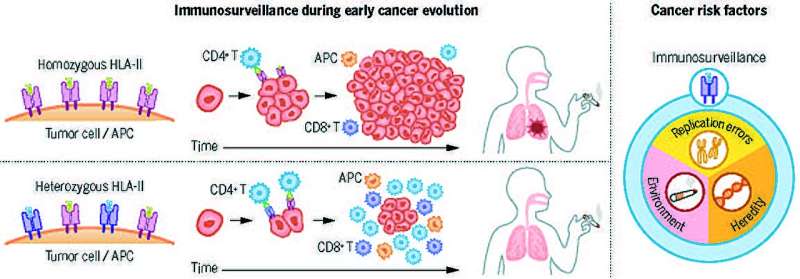This article has been reviewed according to Science X's editorial process and policies. Editors have highlighted the following attributes while ensuring the content's credibility:
fact-checked
peer-reviewed publication
trusted source
proofread
Study reveals new insights into immune system role in lung cancer risk

Recent developments in cancer research have highlighted the vital role of the immune system, particularly in the notable successes of cancer immunotherapy.
Now, a paradigm-shifting study led by researchers at the Icahn School of Medicine at Mount Sinai in New York in collaboration with the University of Helsinki and Massachusetts General Hospital sheds light on how variations in immune genetics influence lung cancer risk, potentially paving the way for enhanced prevention strategies and screening.
The findings were described in the February 22 online issue of Science.
The investigators utilized genetic epidemiology and multimodal genomic analyses of data from the UK Biobank, validating it in FinnGen. Their study focused on human leukocyte antigen (HLA) molecules—the most diverse genes in the human genome and at the core of immune recognition. These genes contain instructions to make proteins, which play a crucial role in presenting foreign antigens on cell surfaces. This process aids the immune system in identifying and eliminating threats such as cancer cells.
Surprisingly, the study found that individuals with heterozygosity (having different versions of a gene) at HLA-II, rather than HLA-I, experienced a decreased risk of lung cancer. This effect was particularly pronounced among smokers, a population already at higher risk for lung cancer due to exposure to carcinogens.
"Our findings challenge conventional thinking by demonstrating that immune genetics, specifically HLA-II heterozygosity, plays a significant role in lung cancer risk, especially among smokers," says co-senior author Diego Chowell, Ph.D., Assistant Professor of Oncological Sciences, and Immunology and Immunotherapy at Icahn Mount Sinai.
"Further, when we added polygenic risk scores—which is a measure of genetic predisposition based on multiple genes—to the analysis, it increased the lifetime risk of lung cancer, specifically in smokers who have identical versions of the HLA-II genes."
The implications of this research extend beyond lung cancer, offering a new perspective on cancer risk assessment, the researchers say. The conventional thinking on the causes of cancer is that the disease is caused by random mutations arising during DNA replication, inherited mutations, and environmental factors.
The research showed that the immune system is also part of the etiology of cancer, Dr. Chowell says. By considering immune genetics alongside hereditary and environmental factors, the investigators aim to develop more effective prevention strategies, potentially harnessing the immune system to combat cancer.
"These results highlight a previously overlooked aspect of cancer risk assessment," says co-senior author Robert Samstein, MD, Ph.D., Assistant Professor of Radiation Oncology, and Immunology and Immunotherapy at Icahn Mount Sinai.
"Our study marks a big step toward understanding the intricate interplay between the immune system and cancer risk. We hope that by identifying individuals with increased susceptibility based on their immune genetics, we can implement more targeted screening, prevention, and treatment strategies."
Next, the research team plans to delve deeper into the mechanisms underlying HLA heterozygosity's protective effects, with a focus on preclinical models of disease. Additionally, they aim to explore the role of non-classical CD4 T cells and HLA class II in cancer biology, opening the door for potential progress in the mitigation and treatment of cancer.
More information: Chirag Krishna et al, An immunogenetic basis for lung cancer risk, Science (2024). DOI: 10.1126/science.adi3808. www.science.org/doi/10.1126/science.adi3808



















